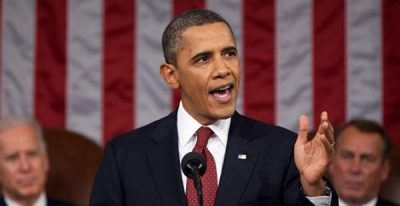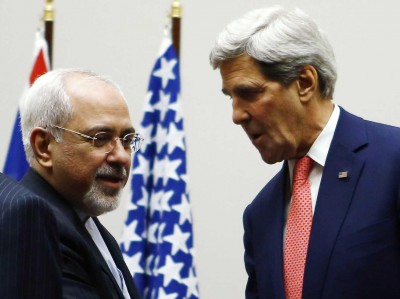 President Obama’s State of the Union speech was pretty depressing. It didn’t start out that way, it was actually a pretty nice strong framework: ‘You members of Congress can’t get anything done, so I’m going to check out what I can do on my own, by executive action, without you.’ He started by raising the minimum wage for federal contract workers – he can do that on his own, maybe it’ll start a groundswell. That’s all good, for those hundreds of thousands of workers and their families (even though his is still below the poverty line for a family of four).
President Obama’s State of the Union speech was pretty depressing. It didn’t start out that way, it was actually a pretty nice strong framework: ‘You members of Congress can’t get anything done, so I’m going to check out what I can do on my own, by executive action, without you.’ He started by raising the minimum wage for federal contract workers – he can do that on his own, maybe it’ll start a groundswell. That’s all good, for those hundreds of thousands of workers and their families (even though his is still below the poverty line for a family of four).
Obama even said “America must move off a permanent war footing.” That should’ve been a Wow! moment. But somehow it wasn’t. He did say he would impose “prudent limitations” on the drone war – his signature war. He even said, “We will not be safer if people abroad believe we strike within their countries without regard for the consequence.” But the problem is we do strike in other countries “without regard for the consequence.” The only “prudent” approach to the drone war is ending it, not just tweaking it a bit. And that’s what we didn’t hear.
We also didn’t hear plans to close down the 700-plus U.S. military bases around the world that create huge social and environmental problems and foment anti-U.S. tensions. We didn’t hear plans for massive cuts in military spending – by closing those bases, cancelling wasteful giant weapons systems, and ending illegal and immoral wars. My commentary on the State of the Union speech analyzes these and more issues we didn’t hear about (plus Iran and a few other things that we did). And if you want to go back to the day before the speech, and look at what President Obama should have been talking about you can get some ideas from my IPS colleagues and me on inequality, trade and Iran (not) in the Syria talks.
Iran and AIPAC
 There is some good news on Iran, but we have to be careful. The American-Israel Public Affairs Committee (AIPAC) is losing — that’s huge. AIPAC has been waging a no-holds-barred, increasingly desperate campaign to derail the interim agreement between Iran and the U.S.-led “Perm 5 + One” global powers (Britain, China, France, Russia, United States and Germany.) Last month it looked like the lobby – as is too often the case – was winning. The AIPAC-led campaign resulted in 49 Senators signing on as co-sponsors of a bill imposing a whole host of new sanctions if Iran didn’t behave exactly as they wanted. They were aiming for a veto-proof 67-vote majority – and getting 49 the first couple days made that seem possible. I discussed the threat of the war-mongers scuttling the agreement here in Common Dreams.
There is some good news on Iran, but we have to be careful. The American-Israel Public Affairs Committee (AIPAC) is losing — that’s huge. AIPAC has been waging a no-holds-barred, increasingly desperate campaign to derail the interim agreement between Iran and the U.S.-led “Perm 5 + One” global powers (Britain, China, France, Russia, United States and Germany.) Last month it looked like the lobby – as is too often the case – was winning. The AIPAC-led campaign resulted in 49 Senators signing on as co-sponsors of a bill imposing a whole host of new sanctions if Iran didn’t behave exactly as they wanted. They were aiming for a veto-proof 67-vote majority – and getting 49 the first couple days made that seem possible. I discussed the threat of the war-mongers scuttling the agreement here in Common Dreams.
But then it stalled. Top U.S. intelligence officials – and crucially, the White House – agreed that new sanctions would be a deal breaker. The White House took an uncharacteristically tough position, calling out those in Congress who preferred war to diplomacy. And during the State of the Union speech President Obama powerfully reminded Congress that diplomacy is working, that negotiations are responsible for “halt[ing] the progress of Iran’s nuclear program…Iran has begun to eliminate its stockpile of higher levels of enriched uranium. It’s not installing advanced centrifuges. Unprecedented inspections help the world verify every day that Iran is not building a bomb.” Then the kicker: “Let me be clear: if this Congress sends me a new sanctions bill now that threatens to derail these talks, I will veto it.” At least three of the original 49 have now pulled back.
So the agreement is in place, and for now it’s holding. That’s all good, but it still faces some danger. Despite opposition from Iran’s own hard-liners (whose position the Washington Post says “mirrors that of Republicans in the U.S. Congress“) Tehran has welcomed UN nuclear inspectors, and is in the process of implementing the various requirements of the agreement. (In case you missed it, you can read my analysis of the agreement here in The Nation.) Washington and its allies haven’t yet begun releasing the small amount of Iran’s assets authorized in the agreement, or begun easing any of the few sanctions the agreement calls for reducing. Hard-core opponents of the agreement, led by Democrat Robert Menendez, remain committed to war over diplomacy. And AIPAC hasn’t given up. The pressure remains. Senate Majority Leader Harry Reid’s refusal to put the new sanctions resolution on the table, President Obama’s threat to veto any new sanctions bill, the 70+ members of the House who have signed a letter supporting the Iran agreement and opposing new sanctions – all could collapse unless public pressure is maintained against AIPAC’s powerful arsenal of bribes and threats. That’s our job – we can’t count on official Washington to do it. Sign the petition here for a start.
Palestine-Israel: The Price to be Paid
 The role of AIPAC makes a necessary segue into talking about Palestine and Israel – I talked about the connection between the Iran talks and Palestine in a discussion on the Real News. That led immediately to Secretary of State John Kerry’s efforts towards a new framework to lay the groundwork for a future agreement. Oh, you thought he’s finally drafting a real comprehensive, just, permanent peace agreement that would actually resolve all the crucial elements of settlements, borders, refugees, Jerusalem, etc.? Oh no, that’s so last summer…
The role of AIPAC makes a necessary segue into talking about Palestine and Israel – I talked about the connection between the Iran talks and Palestine in a discussion on the Real News. That led immediately to Secretary of State John Kerry’s efforts towards a new framework to lay the groundwork for a future agreement. Oh, you thought he’s finally drafting a real comprehensive, just, permanent peace agreement that would actually resolve all the crucial elements of settlements, borders, refugees, Jerusalem, etc.? Oh no, that’s so last summer…
That’s when we first heard about Kerry’s new shuttle diplomacy. It never had much of a chance – I called it the “Einstein Round” of the U.S. peace process – the great scientist’s definition of insanity was doing the same thing over and over and expecting a different result. Unfortunately that’s still the case – although Kerry has achieved something none of his predecessors ever did: he managed to prevent almost all leaks throughout months of not-in-the-same-room negotiations. Until the leaks – apparently quite well orchestrated – began early in January, apparently to begin preparing Palestinian, Israeli and U.S. publics for the result.
It’s not a pretty sight. According to top PLO official Yasir Abed-Rabbo, Kerry’s ‘framework’ – as distinct from an actual agreement – would
- Require Palestinian recognition of Israel as a Jewish state (thus legitimizing the second-class or worse status of Palestinian citizens of Israel).
- ‘Solve’ the refugee crisis by allowing Palestinian refugees only into the new Palestinian state instead of the UN-mandated right to return to their homes in Israel,
- Ensure permanent Israeli control and likely annexation of the large settlement blocs with about 80% of the illegal Jewish settlers.
- Allow permanent Israel control of “Palestine’s” border crossings and air space.
- Endorse permanent or near-permanent Israeli military forces in the occupied Jordan Valley, perhaps adding U.S., Jordanian and/or even Palestinian security forces to them.
- Allow Israeli forces ‘hot pursuit’ into Palestinian territory.
The word from Kerry’s delegation chief Martin Indyk, though, should reassure us all – both sides can sign on to the U.S. framework “with reservations” – meaning it won’t actually have any meaning at all. The framework seems far more tied to Obama and Kerry legacies than to an actual end to Israeli occupation and apartheid. That doesn’t mean that something some people might call a “Palestinian state” won’t someday be declared through this process – it just means that that will be a far cry from a just and comprehensive solution grounded in international law, human rights and equality for all.
As has been the case with earlier U.S. ‘frameworks,’ the Kerry plan is limited to arrangements only for inside parts of the Occupied Territories. The settlements remain in Israeli hands. The borders – presumably the Apartheid Wall — will become the new “border.” Israeli and U.S. soldiers will remain in control of security. A big question will be Jerusalem: The Kerry proposals apparently do call for a Palestinian capital in the city, but it is almost certain it will not mean a real shared capital with the Palestinian flag flying over the center of Arab East Jerusalem. Rather, Israel will almost certainly assert its current revisionist demography – in which the outline of “Greater Jerusalem” extends from Ramallah in the North down past Bethlehem and out east almost to the Jordan Valley – to situate Palestine’s capital someplace like Abu Dis, a dusty village outside of Jerusalem. It abuts what was once the old Silk Road, a narrow potholed street that now dead-ends into the Apartheid Wall.
On the other hand, both Israeli and Palestinian negotiators conditioned their participation in these talks on the understanding that any agreement would require ratification by a popular referendum – something virtually guaranteed to fail on all sides.
In the meantime, the Apartheid Wall continues to be expanded, dispossessing Palestinians from their land as it goes. Settlement expansion continues across the West Bank and East Jerusalem. And in Gaza, the siege continues, with 1.8 million people largely locked inside the walled-in Strip, exports prohibited, and imports dramatically curtailed by the Israeli military. The situation has significantly worsened since the overthrow of elected Egyptian President Mohamed Morsi last summer and a resulting tightening of Gaza’s crossing to Egypt, and a massive storm last month created dire new humanitarian crises. You can watch my discussion of the Gaza siege here.
In Israel, the Butcher of Beirut, as he was long known, is no more. After eight years in a coma, during which the militaristic hard-right leader was re-branded a peacenik, Israeli General Ariel Sharon was finally pronounced dead. The tributes poured in, including from Secretary of State John Kerry, who paid lip service to occasional disagreements with Sharon, but reassured Israel that “Our nation shares your loss and honors Ariel Sharon’s memory.” For the rest of the world, of course, there is nothing – nothing – remotely honorable in the legacy of Israel’s perhaps most consistent war criminal. You can read the rest of my assessment of Sharon and Sharonism here.
The Good News
On the other hand, beyond the rise of the right and the certain failure of the U.S.-backed negotiations, non-violent economic, political, media and popular pressure is rising against Israel’s violations. The last couple of years’ rise in influence of the eight-year-old global BDS movement, which calls for boycotts, divestment and sanctions until Israel stops violating three areas of international law and human rights, has been dramatic.
Recent victories include the decision by the American Studies Association (ASA), following the examples of the Asian-American Studies Association and the Native American Studies Association to boycott Israeli academic institutions. The decision, supported by an overwhelming majority, led to outrage from supporters of Israel’s occupation and apartheid policies, including an effort by the New York State Assembly to withdraw funding from the ASA. But as AIPAC and the rest of the pro-Israel lobbies (Jewish and Christian) face so many challenges, that effort collapsed, and the Assembly withdrew the bill under a withering attack from defenders of free speech.
Oxfam’s decision to sack super-star Scarlett Johansson because of her high-visibility endorsement of SodaStream, whose manufacturing plant is located in the Israeli settlement of Ma’ale Adumim in the occupied West Bank, was another indicator of the discourse shift. Another indicator is the new level of access to the op-ed pages of the most influential newspapers. The New York Times published Avi Schlaim’s “Israel Needs to Learn Some Manners,” exposing Kerry’s initiative as a “clever American device for wasting time,” and three days later published BDS leader Omar Barghouti on “Why Israel Fears the Boycott.” The Washington Post weighed in with Vijay Prasad’s “A Caution to Israel” supporting the ASA boycott call.
The Post finally acknowledged that “talk about a boycott of Israel is in the mainstream.” And the paper noted, for anyone doubting that seismic discourse shifts are underway, that Kerry himself warned Tel Aviv to be aware of “talk of boycotts and other kinds of things,” resulting in a chorus of Israeli outrage.
Action aimed at changing U.S. policy on

Israel-Palestine has never been more engaged. For anyone interested, in a series of interviews I did with Paul Jay of The Real News, we began with a discussion of how I first got involved with Palestinian rights, after a childhood of active Zionist organizing. (Hint: it has to do with Viet Nam.)
I’m also now on the short-list of candidates to succeed my great colleague and friend Richard Falk as the next United Nations Special Rapporteur for Human Rights in the Occupied Palestinian Territories. The selection process is currently underway at the Human Rights Council in Geneva.
There’s a lot more to talk about – the still-escalating crisis in Syria and the Syria negotiations, the dangerous moment in Egypt, rising violence in Iraq and the still-raging war in Afghanistan. Those will have to wait for the moment.
But I did want to leave one more memory of Pete Seeger. It’s hard to imagine going forward without Pete’s unstoppable, grounded optimism, his clear-sighted understanding of the need for songs to move our movements forward. What a gift that we had Pete with us all these years. He remains within the pantheon of our movements’ greats. You can read my appreciation here. Go well, Pete, we’ll carry on your songs from here.
